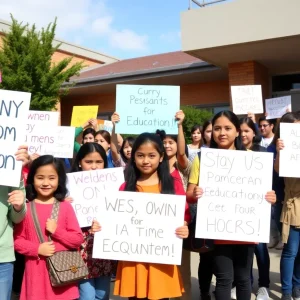Bridging the Digital Divide in Kansas City
Kansas City has always prided itself on being a beacon of innovation and community growth. But there’s a pressing issue that many might not realize exists right beneath the surface—a significant digital divide. In our increasingly connected world, access to reliable internet is more than just a convenience; it’s a fundamental necessity.
The Importance of Internet Access
Think about it: the internet opens doors to employment opportunities, facilitates education, delivers health care, and so much more. It’s hard to imagine navigating daily life without a reliable connection. Yet, a stark contrast exists in Kansas City, highlighting a deep racial and economic divide along Troost Avenue, which has become a notorious marker of disparity in our city.
Understanding the Divide
A recent study titled “Bridging the Digital Divide: The Impact of Broadband Access on Regional and Community Growth in Kansas City, Missouri” sheds light on this issue. It reveals that households residing east of Troost are far less likely to have internet service compared to those on the western side. Shockingly, only 3% of respondents west of Troost reported not having an internet subscription, while the number skyrockets to 23% for those on the east. This disparity is alarming and speaks volumes about the underlying issues that have plagued our city for decades, including redlining and housing discrimination.
The Cost Barrier
For many who do have internet access, the cost often acts as a significant barrier. It’s not just about whether the service is available; it’s about whether people can afford it. The costs associated with internet subscriptions can further entrench the social divides, limiting economic and educational opportunities for households in lower-income areas.
The Ripple Effects of Limited Access
So, why does this matter? Without reliable internet, individuals and families in underserved areas find it increasingly challenging to do things many take for granted, such as applying for jobs or accessing online learning. The ability to connect with telehealth services, stay informed about current events, or even access essential documents can profoundly influence overall quality of life. When some members of our community face these obstacles, it’s not just a technological issue—it’s a social justice issue.
Beyond Infrastructure: The Need for Digital Inclusion
While initiatives like Google Fiber, which was launched in 2011, aimed to provide high-speed internet access throughout the city, the reality has been a bit more complex. Despite its potential, the rollout has highlighted existing disparities rather than sufficiently addressing them. This illustrates that simply providing infrastructure isn’t enough; we also need to consider factors such as digital literacy and the availability of adequate hardware.
The Push for Greater Funding
For meaningful change to occur, there must be greater investment in programs designed to enhance broadband access. Unfortunately, funding for initiatives like the Federal Communications Commission’s Affordable Connectivity Program (ACP) has been inconsistent. As of early 2024, the ACP—the program that provided much-needed subsidies for low-income families—stopped accepting new applications, leaving many in a difficult position.
Community Efforts and Advocacy
Fortunately, many community organizations are stepping up to raise awareness of this digital divide. Groups like LiteracyKC, KC Digital Drive, and PCsForPeople are working tirelessly to advocate for change, offering digital literacy programs, resources, and education. Their efforts showcase the dedication of regular citizens eager to bridge the gap—one step at a time.
A Call to Action
To truly close the digital divide in Kansas City, we need a collective effort from local leaders, policymakers, and private companies. Everyone deserves access to the internet, regardless of their income, race, or neighborhood. If you believe in equal access for all, consider reaching out to your congressional representatives to encourage them to vote in favor of the ACP Extension Act. Let’s move forward together, ensuring that no one in our community is left behind.







